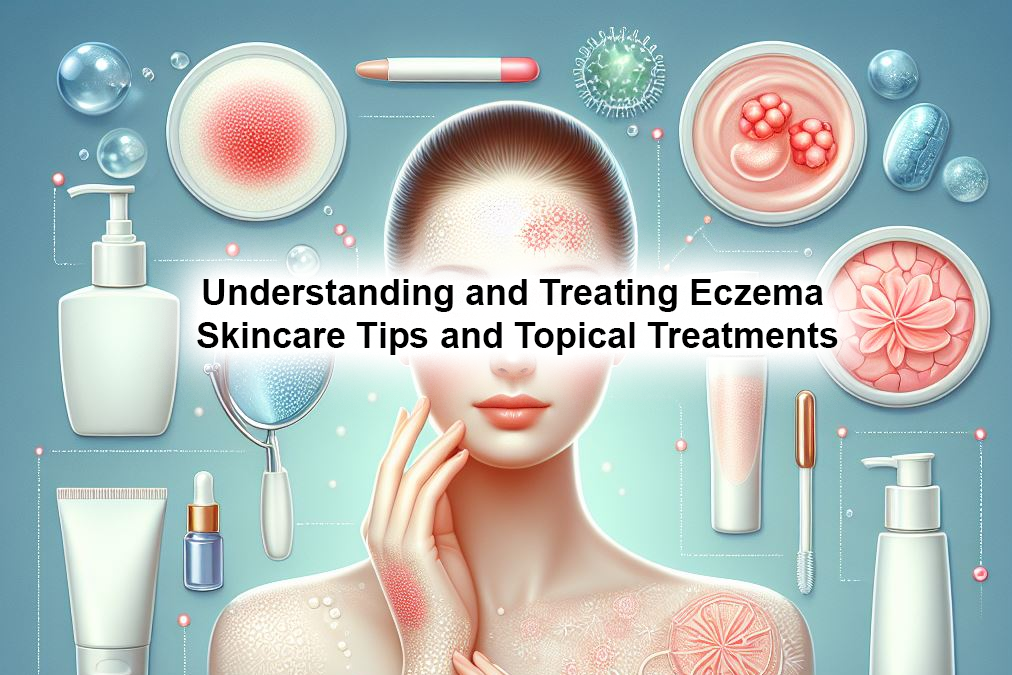Eczema, also known as atopic dermatitis, is a common skin condition characterized by inflammation, itchiness, and redness. Understanding how to manage and treat eczema is crucial for those affected by it. In this article, we’ll delve into skincare tips and topical treatments to help alleviate symptoms and improve skin health.
What is Eczema?
Eczema is a chronic skin condition that causes the skin to become inflamed, itchy, and irritated. It often appears as red, dry, and scaly patches on the skin. Eczema can vary in severity, with some individuals experiencing occasional flare-ups while others have persistent symptoms. It is believed to be linked to genetics, environmental factors, and a malfunction in the body’s immune system.
Skincare Tips for Eczema Relief
- Hydrate the Skin: Moisturizing regularly is essential for eczema management. Use a fragrance-free and hypoallergenic moisturizer to lock in moisture and prevent dryness.
- Avoid Triggers: Identify and avoid triggers that exacerbate your eczema symptoms. Common triggers include certain fabrics, harsh soaps or detergents, extreme temperatures, and stress.
- Gentle Cleansing: Opt for mild, non-irritating cleansers when bathing or showering. Avoid hot water, which can strip the skin of its natural oils, and pat the skin dry instead of rubbing.
- Clothing Choices: Wear soft, breathable fabrics like cotton to reduce irritation and allow the skin to breathe. Avoid rough or scratchy materials that can aggravate eczema.
- Manage Stress: Stress can trigger eczema flare-ups, so practicing stress-reduction techniques such as yoga, meditation, or deep breathing exercises can be beneficial.
- Stay Cool: Keep the skin cool and avoid sweating excessively, as heat and sweat can worsen eczema symptoms. Use fans or air conditioning during hot weather.
- Avoid Scratching: Although it may be tempting, scratching can damage the skin and worsen eczema symptoms. Keep nails short and consider using anti-itch creams or cold compresses to relieve itching.
- Regular Moisturization: Apply moisturizer multiple times a day, especially after bathing, to help restore the skin’s barrier function and prevent flare-ups.
- Use Fragrance-Free Products: Fragrances and perfumes can irritate sensitive skin, so choose products labeled as fragrance-free or hypoallergenic.
- Consult a Dermatologist: If over-the-counter skincare products are not providing relief, consult a dermatologist for personalized treatment options and recommendations.
Topical Treatments for Eczema
Topical treatments play a crucial role in managing eczema symptoms and reducing inflammation. Here are some commonly used topical treatments:
- Corticosteroids: Topical corticosteroids are anti-inflammatory medications that help reduce redness, itching, and swelling associated with eczema flare-ups. They come in varying strengths and should be used as directed by a healthcare professional.
- Topical Calcineurin Inhibitors: These medications suppress the immune response in the skin and are effective in treating eczema, especially in sensitive areas like the face and groin.
- Moisturizers: Emollients and moisturizers help hydrate the skin and repair the skin barrier, reducing the frequency and severity of eczema flare-ups. Look for products containing ingredients like ceramides, glycerin, and hyaluronic acid.
- Antibiotics: In cases where eczema becomes infected, topical antibiotics may be prescribed to treat bacterial infections and prevent further complications.
- Antihistamines: Oral antihistamines can help relieve itching and discomfort associated with eczema, although they do not address the underlying inflammation.
- Wet Wrap Therapy: This technique involves applying moisturizer to the skin and covering it with wet bandages or clothing to enhance hydration and reduce inflammation.
- Phototherapy: In phototherapy, the skin is exposed to ultraviolet light under medical supervision, which can help reduce inflammation and improve eczema symptoms.
Understanding the available topical treatments and working closely with a healthcare professional

